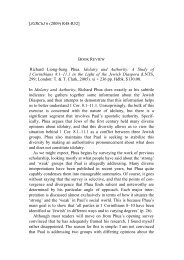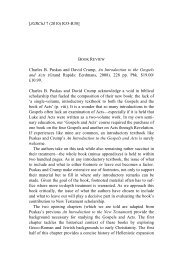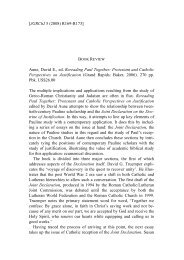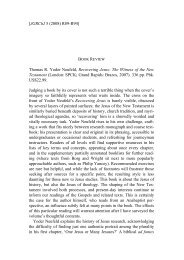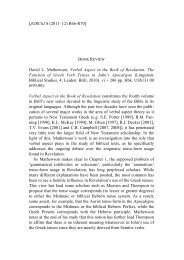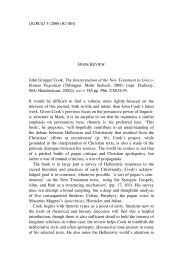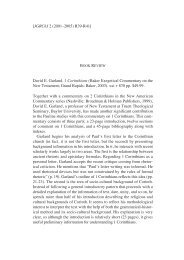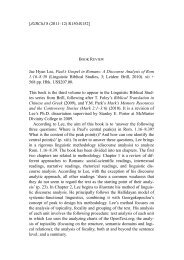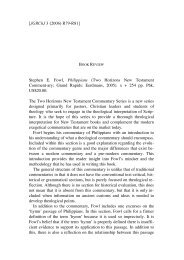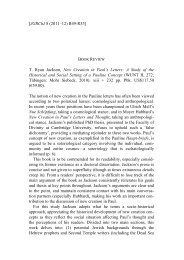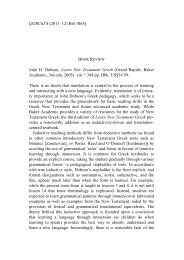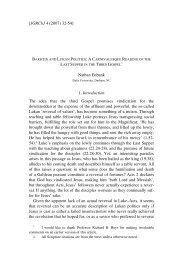The Politics of Ephesians and the Empire - Journal of Greco-Roman ...
The Politics of Ephesians and the Empire - Journal of Greco-Roman ...
The Politics of Ephesians and the Empire - Journal of Greco-Roman ...
You also want an ePaper? Increase the reach of your titles
YUMPU automatically turns print PDFs into web optimized ePapers that Google loves.
Gupta & Long <strong>Politics</strong> <strong>of</strong> <strong>Ephesians</strong> <strong>and</strong> <strong>the</strong> <strong>Empire</strong> 129<br />
up, O sleeper, <strong>and</strong> arise from <strong>the</strong> dead <strong>and</strong> Christ will shine on you”.’<br />
Since <strong>the</strong> sons <strong>of</strong> disobedience are ‘dead in sin’ (2.1-2), this is a call for<br />
<strong>the</strong>m to come alive <strong>and</strong> come into <strong>the</strong> light <strong>of</strong> Christ. This leads quite<br />
naturally to <strong>the</strong> admonition for believers to ‘live wisely making <strong>the</strong> most<br />
<strong>of</strong> <strong>the</strong> opportunity’ (5.15-16). <strong>The</strong> parallel text in Col. 4.5-6 is a call to<br />
evangelize. <strong>Ephesians</strong> 5.17 fur<strong>the</strong>r calls believers to ‘underst<strong>and</strong> what<br />
<strong>the</strong> will <strong>of</strong> <strong>the</strong> Lord is’. As stated clearly earlier in <strong>the</strong> discourse, God’s<br />
will is to adopt people into <strong>the</strong> divine family (1.5) <strong>and</strong> to have Christ<br />
sum up all in God’s economy <strong>of</strong> salvation for all (1.9-14). So, all this<br />
evangelistic context leads to <strong>the</strong> HC. Thus, <strong>the</strong> HC in <strong>Ephesians</strong> does<br />
not serve primarily <strong>the</strong> purpose <strong>of</strong> maintaining <strong>the</strong> st<strong>and</strong>ards <strong>of</strong> society;<br />
instead, it is missional. 63<br />
While <strong>the</strong> similarities <strong>of</strong> appeal to submission <strong>and</strong> <strong>the</strong> sets <strong>of</strong><br />
relationships addressed are easily recognized, <strong>the</strong> HC in <strong>Ephesians</strong><br />
especially bears <strong>the</strong> marks <strong>of</strong> extensive modification, elaboration <strong>and</strong><br />
transformation. 64 In <strong>the</strong> first place, <strong>the</strong>se relationships are thoroughly<br />
recast in terms <strong>of</strong> Jesus as ‘Lord’ (5.22; 6.1, 4, 7-9) <strong>and</strong> ‘Messiah’<br />
(5.23-25, 29, 32; 6.5-6). Fur<strong>the</strong>rmore, Jesus Christ as Lord indicates <strong>the</strong><br />
basis, context or motivation for <strong>the</strong> comm<strong>and</strong>s; obedience to <strong>the</strong> HC is<br />
‘in fear <strong>of</strong> Christ’ (5.21) <strong>and</strong> ‘in <strong>the</strong> Lord’ (6.1). 65 If we combine this<br />
re-contextualizing <strong>of</strong> <strong>the</strong> HC with <strong>the</strong> description <strong>of</strong> Jews <strong>and</strong> Gentiles in<br />
Christ forming a ‘household <strong>of</strong> God’ (oi0kei=oi tou= qeou=; 2.19), one can<br />
63. That is not to say that <strong>the</strong> HCs demonstrate values that Jews <strong>and</strong> early Christians<br />
did not <strong>the</strong>mselves hold. Indeed, E. Schweizer argues that <strong>the</strong> New Testament HCs<br />
hold some parallels to household discussions in Hellenistic Jewish literature, which<br />
have a distinct interest in <strong>the</strong> welfare <strong>of</strong> <strong>the</strong> weak <strong>and</strong> disadvantaged in society; see E.<br />
Schweizer, ‘Die Weltlichkeit des Neuen Testamentes: Die Haustafeln’, in H. Donner<br />
et al. (eds.), Beiträge zur alttestamentlichen <strong>The</strong>ologie. Festschrift W. Zimmerli<br />
(Göttingen: V<strong>and</strong>enhoeck & Ruprecht, 1977), pp. 397-413.<br />
64. So modified <strong>and</strong> Christian are <strong>the</strong> codes that H.W. Hoehner, <strong>Ephesians</strong>: An<br />
Exegetical Commentary (Gr<strong>and</strong> Rapids: Baker, 2002), p. 724, argues that ‘<strong>the</strong>re is<br />
little, if any, indication that <strong>the</strong> source <strong>of</strong> <strong>the</strong> NT household codes are <strong>the</strong> Hellenistic<br />
household codes’. Hoehner admits, however, that Paul would have known <strong>the</strong> codes,<br />
but argues, ‘Whereas in Hellenism <strong>the</strong> model was political, <strong>the</strong> Christian model is<br />
Christ himself, <strong>and</strong> he is also <strong>the</strong> motivating force’ (p. 725). As much as we agree<br />
with <strong>the</strong> distinctions in <strong>the</strong> <strong>Ephesians</strong> HC Hoehner observes, <strong>the</strong> essential problem<br />
with his view lies in not underst<strong>and</strong>ing <strong>the</strong> thoroughly ancient political nature <strong>of</strong><br />
<strong>Ephesians</strong>.<br />
65. So, Hoehner, <strong>Ephesians</strong>, p. 725, who also includes a chart describing <strong>the</strong><br />
motivation.



